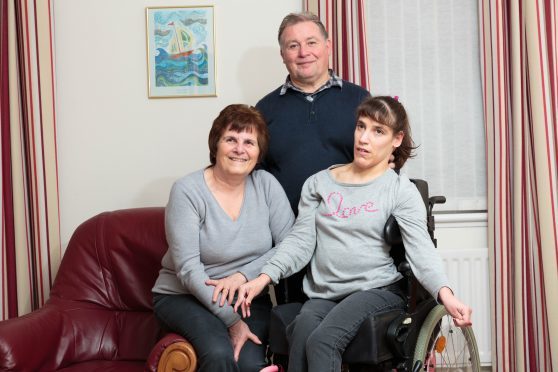The father of a severely disabled woman hit out today after council bosses stopped funding her travel costs for a vital bus service to a day centre which will leave his daughter housebound.
Susanne Haining, 30, who suffers from cerebral palsy, has been attending the Ellon Resource Centre, which is based eight miles away from her Balmedie home, for the past 12 years.
But now the local council has decided that she no longer qualifies for transport to the facility because she receives the highest mobility component of Disability Living Allowance due to her condition.
To make matters worse, her family have also been informed that they cannot pay for the bus fare because there is no legal method open to the local authority to take money for the service.
Susanne’s dad Bill, 64, said the council had effectively hijacked a national benefit to save themselves cash which left him to find the money to pay for a carer to take his daughter to the facility.
And many other families with severely disabled children will find themselves in the same position next year due to the change in Aberdeenshire Council rules.
Bill, a retired ambulance training manager, said: “Aberdeenshire Council through their social and healthcare partnership has decided that there is an issue of double funding for clients who have the higher rate of mobility in their disability living allowance payments.
“They are saying that if you have that then you have already been paid for any transport that you require, so therefore they don’t need to provide transport through the resource centre.
“That is a highjacking of a national benefit to make a local council saving without even taking into consideration the fact that it is not for transport alone.
“The money is for mobility, to include spending on things such as a shower chair, frame, wheelchair. It is not a transport payment.
“People who don’t have the higher rate of mobility in their DLA will still get free transport to the centre. The bus will still be coming past Susanne’s door in order to pick up people to take them to the centre.
“It is not a fair situation.”
Bill said the parents of severely disabled children were being called in individually to annual review meetings to inform them that clients receiving the mobility allowance would no longer be able to access transport.
The 64-year-old added: “It has already stopped for two or three other people.
“It is all wrong. This is having a direct effect on people who are already severely disabled and who find it hard enough to have any normal life.
“Now that they have taken this away, it leaves Suzanne with very little.
“I can see no obvious cost saving, because the bus that picks up Suzanne will continue to go to Balmedie and pick up people who are less disabled.”
The father-of-four, who lives with his 64-year-old wife Margaret, who is blind and unable to drive, said the family were warned that Susanne can only continue to use the bus until January.
Their daughter attends Ellon Resource Centre five days a week where she receives aid from therapists who help her with mobility exercises and encourage her to get the most out of her life.
The 55 pounds a week mobility money she receives would not be enough to cover another method of transport.
Bill added: “As more and more reviews take place I would think they will continue to take people off that bus until it is no longer required and then they will have absolved themselves of any responsibility for transport to and from the centre.
“We’ve now got to find someone to drive Suzanne in and out of the centre which will cost more. That little bit of independence that she had of being transported in her own right has now been taken away.
“If we don’t find another person to drive her then she will be stuck in the house.”
Head of Adult and Criminal Justice Services Philip English said: “There is no regular bus provision to Ellon Resource Centre as service users all have individual requirements and care plans and the service provided in terms of transport to access services is responsive and acutely linked to their needs.
“However, where people are unable to provide transport, or are in receipt of mobility benefits, this is taken into consideration in assessing what their transport needs are and how to meet them.
“As we conduct individual person-centred reviews it may be that transport arrangements change.”
